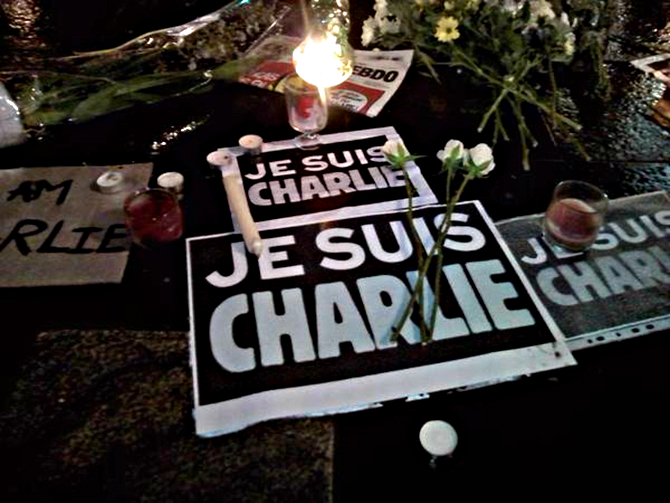
Designed to offend
The caricatures that most people have been sharing from Charlie Hebdo are intentionally designed to offend Muslims – not simply in that they depict the prophet Muhammad, but that they portray a hook-nosed, fundamentalist caricature of a Muslim. The cartoons are not something that most tolerant, open-minded people would produce. They are the free expression of people with negative opinions towards the Islamic faith. Charlie Hebdo had every right to mock the prophet Muhammad, and nobody had a right to murder its journalists or use force to prevent it from doing so. The fact that this right exists, however, does not mean that we ought to express its opinions, and in fact there are many reasons why sharing the caricatures from Charlie Hebdo will have a negative impact on people who may be close to you, and on the overwhelming non-violent majority of Muslims.
Right to free expression
You do not have to be Charlie Hebdo to support its right to free expression. It has different opinions than you do, as does every publication and individual in the world. You are a person with your own beliefs, and those are the beliefs you should express. If you normally believe that intentionally causing extreme distress to a vulnerable section of society with hook-nosed caricatures of their most sacred prophet is wrong, an act of violence should not shock you out of that opinion. This principle seems obvious when you consider what would happen if a KKK publication were attacked in a similar way. It seems unlikely that a huge section of the international media would, or should, plaster white supremacist images across their front pages because of the violation of the principles of free expression. Causing unnecessary harm to your peaceful Muslim friends and acquaintances by sharing these images is not the correct response- supporting them against the racist backlash while mocking and attacking extremism of both Muslims and non-Muslims is the best way of supporting an accepting society.
The group that most Irish people I have seen sharing these images have intended to target for offense and upset is very small. Those who believe that violence is a legitimate means of shutting down freedom of expression which goes against their interpretation of Islam. This is not the group who will be hurt by this. While obviously they will be angered by these actions, this group broadly are already disgusted by Western liberal society and have concluded that it must be destroyed.
Widespread sharing these images does provide them with a victory on one of their central goals, however. It deepens cultural cleavages between the Muslim and non-Muslim majorities. There is far more in common between Muslims and non-Muslims than there are differences, but one of these differences is attitudes towards caricatures of Muhammad. A sizeable number of Western Muslims and their representative organisations do believe that such images do not fall under legitimate freedom of expression. It is important to note that believing in certain limitations on freedom of expression is not something which is outside the political mainstream in Europe – a very large number of European countries, including France, prohibit Holocaust denial, as do many countries including Ireland ban incitement to hatred.
Repercussions
This is not, however, the right time for a debate about whether attacking Muhammad is legitimate expression. The world is reeling from an attack and many are looking for an enemy to blame, not to understand the complexities of Western Islam and engage in cultural dialogue. Muslims who feel compelled by religious duty to defend their prophet through legal means will simply be viewed as sympathisers with terrorist violence, including many large mainstream Muslim organisations. Those who seek less symbolic means of retaliation against the Charlie Hebdo attack may use violence against peaceful, mainstream Muslims, mosques, and organisations.
If Muslims are seen as defending terrorists, extremist organisations like the National Front, EDL, and PEGIDA will gain support – and the more non-Muslims are radicalised against Muslims, the more Muslims will feel under attack by wider society, and some of those will join extremist organisations. Extremists want westerners to hate Muslims because an accepting society stifles the conflict which is their lifeblood. They want us to alienate our friends and acquaintances, they want Muslim teenagers to see their classmates attacking their prophet and feel that they are different- they want the myth that there is a clash of civilisations to be true as much as Marine Le Pen does.
We can be better. One of those killed in the Charlie Hebdo attack, Ahmed Merabet, was a Muslim police officer tasked with protecting their offices. The publication mocked and attacked his prophet and his faith- and yet he protected their right to speak. I ask everyone to use that right to speak out for the vulnerable, for those who will suffer prejudice and hatred as a result of the actions of an unrepresentative minority, for everyone who will be suspiciously asked whether they support terrorism despite every major Muslim organisation in the world rushing to condemn the attack. We should speak in our own voice- to defend both our rights, and the accepting, pluralistic society I believe we should want.






